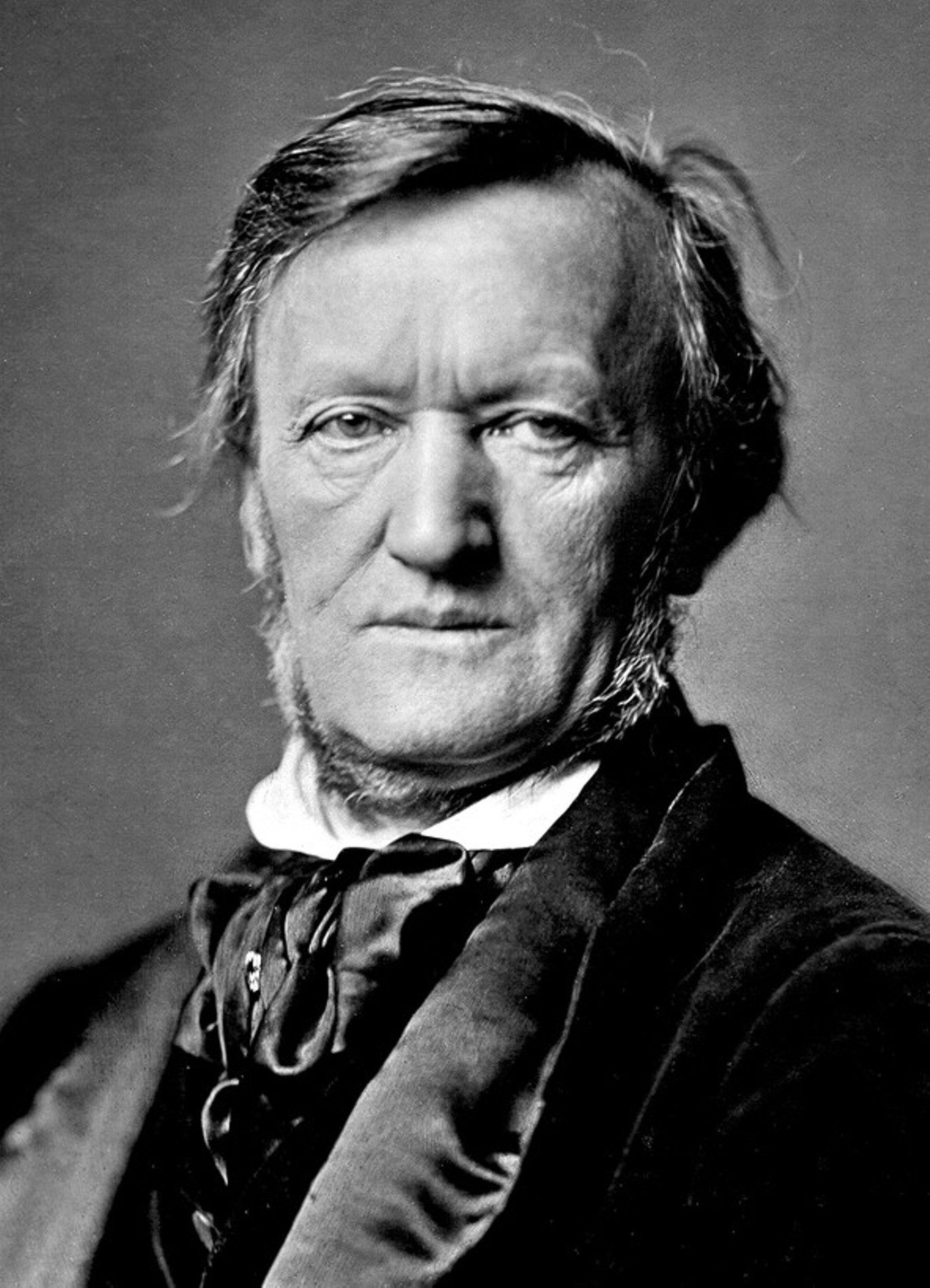 |
| Richard Wagner, Munich. 1871. by Franz Hanfstaengl. Via Wikimedia. |
Richard Wagner was an extraordinarily talented musical genius. Almost singlehandedly he revolutionized opera, completing its transformation from the traditional recitative–aria format to a continuous musical drama. He was born in 1813 in turbulent times in Leipzig. There four months after his birth the combined forces of Prussia, Austria, Sweden, and Russia defeated the once invincible Napoleon in the great Battle of the Nations where over half a million soldiers fought one another and 127,000 were killed.
Wagner’s family first lived in Leipzig in the Jewish quarter, paradoxically so in view of his later anti-Semitism. His father, a clerk in the police force, died from typhus six months after his birth. Young Richard, the ninth child in the family, was a “pale, slim little chap in short-armed frocks . . . but already unruly enough.”1 Brought up in the house of a stepfather who inspired in him a love of the theater, he attended schools in Dresden and after 1829 back in Leipzig. He learned Greek and Latin, read Shakespeare and Goethe, and early on tried his hand at writing tragedies and orchestral overtures. In 1831 he went to the University of Leipzig, where he so impressed his composition teacher by his ability that he refused to be paid for his lessons. After graduation he held musical positions in Würzburg and Magdeburg, then became music director of the local opera in Riga, Lithuania, from where he had to flee from his creditors in the middle of the night. Indeed for most of his life, he was beset by financial troubles.
Wagner lived in Paris until 1842. He then returned to Dresden for six years as conductor of the symphony. When the populist revolutions broke out in Europe in 1848, he was sympathetic to the liberal cause but played a very small part in it, though enough to be in danger of being arrested. Fleeing abroad, he lived in exile in France, Switzerland, and Venice. He was not allowed to return to Germany until 1862. By that time he had become famous through his compositions: Rienzi (1842), The Flying Dutchman (1843), Tannhauser (1845), and Lohengrin (1850). Between 1848 and 1874 he wrote the music and libretti of the four parts of the Ring of the Nibelungs; also began work on the Meistersingers of Nurnberg, Parsifal, and Tristan and Isolde, which he completed much later. In 1864 he fell in the favor of King Ludwig II of Bavaria, who greatly admired and supported him, settled his debts, staged his plays, and arranged for him to live in a villa by the shores of Lake Lucerne. In 1871 Wagner moved to Bayreuth where he built his famous opera house. Most of his life he had a turbulent relation with women, including his marriage and several love affairs and infatuations. His first wife, Minna, died in 1866, and he eventually married Cosima von Bulow, the wife of his friend and daughter of Franz Liszt. He died of a heart attack in 1883 at age sixty-nine.
Wagner was an extraordinarily highly strung individual. Even in his childhood he slept badly, disturbing his siblings by shouting and talking in his sleep. In a paper published in JAMA in 1903, Dr. George Gould described him as having the symptoms of “DeQuincy, Carlisle, Darwin, Huxley, Browning, Wittier, Spencer, and Parkinson altogether and all at once.”1 These people all suffered from sick headaches, dyspepsia, nervousness, melancholy, and insomnia “in direct proportion to the amount of reading and writing they attempted” straining their eyes, and working until “threatened either by disease or by despair.”1 Ever since childhood Wagner was subject to a recurrent ill-defined skin disease that has been variously characterized as eczema or erysipelas. He suffered all his life from headaches, complaining about “the nerves of his brain,” perhaps tension headaches or migraine, possibly the extremely painful cluster headaches which are now treated with oxygen inhalations but for which at the time no remedy had been found. In middle age he was often depressed, anxious, and very introspective, planning to compose a big work on German mythology but obsessed by thoughts of dying and not living long enough to accomplish it, writing “I’m terribly fatigued again,” (1851) and “I am daily thinking of my death,” (1852) while always suffering from sleeplessness.1 He was also subject to rheumatic pains and most of his life had symptoms of dyspepsia. Like Darwin, he took water treatments, which apparently alleviated his symptoms for some time.2
How many of Wagner’s symptoms were functional, caused by anxiety and depression, is difficult to say, but much seems to have been due to his lifestyle, overwork, and possibly eye strain.1 He was a great genius, though perhaps not a very nice man. His compositions continue to be played regularly in all the concert halls of the world and he wrote some of the greatest musical works of all time.
References
- Gould, G.M. The ill-health of Richard Wagner, JAMA 1903; 51: 293 and 368.
- Hayman, Charles Darwin’s illness and the ‘wondrous water cure’. Hektoen International Science section. Summer 2019.
GEORGE DUNEA, MD, Editor-in-Chief

Leave a Reply